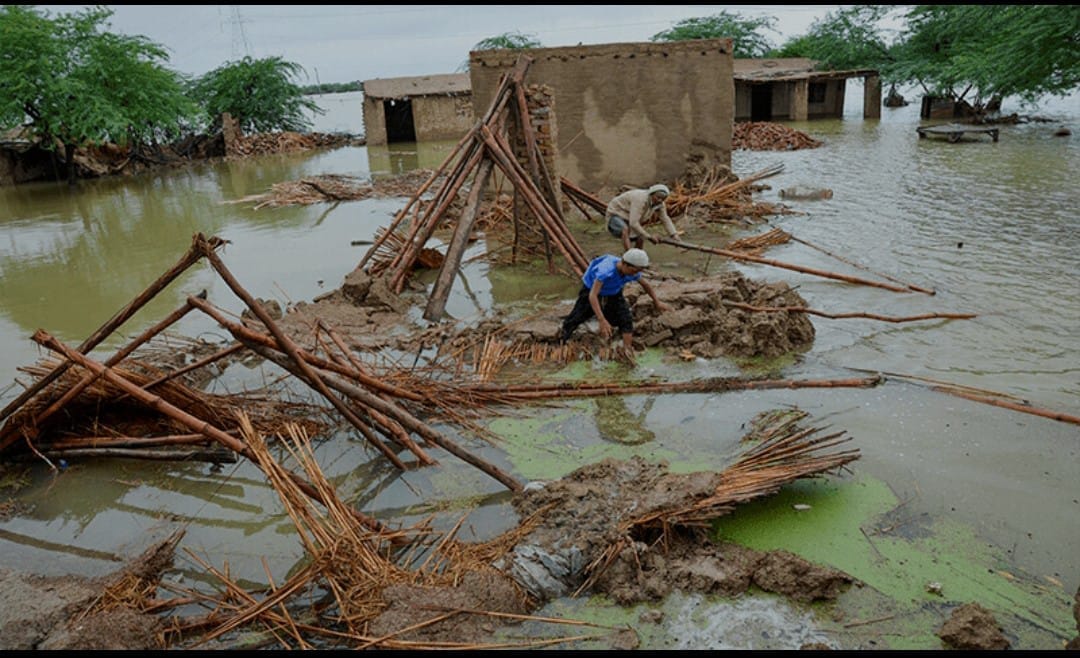By: Waqas Qamar Bhatti
Pakistan is now a landscape that words can scarcely contain. Once celebrated for its lush green fields, the land has transformed into a waterlogged graveyard of mud and misery. The air carries no fragrance of soil, only a suffocating dampness. And that dampness is not merely moisture—it is the collective cry of a nation undone. The sky, once a witness to harvests and hope, now pours not life but death. What once was the flow of nature has become a blind, raging vengeance, sweeping away everything—from the roots of the earth to the very soul of the people.
The flood did not arrive; it attacked. It surged, struck, toppled, and consumed everything in its path. Houses built over generations crumbled within seconds, erased as though they never existed. Roofs collapsed, walls fell, and with them vanished the photographs that told stories of joy and struggle—the wedding day smiles, the fading portrait of a martyr, a mother’s warmth, a father’s weary eyes. Nothing remains. No homes, no doorways, no footsteps, no signs that life once thrived here. Everything has been washed away.
Vehicles that once symbolized progress now lie overturned in drains, lodged in trees, or drifting aimlessly in the currents—lost, without past or destination. Animals, once valued even above property, have drowned. Buffaloes, goats, horses, chickens—their lifeless bodies buried in mud. Their eyes are closed now, but the question lingers: what sin did they drown for?
The farmers who once coaxed sustenance from the soil now raise those same hands helplessly to the sky. The fields that once bore vegetables now produce only poison: water not of fertility, but of fatality. Seeds have washed away, ploughs have sunk, and with them the dreams a father once planted in the eyes of his children with every new season. Mothers who had spent years collecting fabrics for their daughters’ dowries have lost it all. Brides awaiting joy now sit roofless and silent in corners. Children who once walked proudly to school now huddle in tents, clutching plastic bags instead of books, hoping only to keep the rain off their heads.
They say rivers can sometimes fall silent—but today, they scream. The waves that once whispered of peace are now shrouded in decay. The land is not merely soaked; it is sobbing. Every muddy street, every courtyard once filled with lullabies, now lies lifeless. And in the ruins of homes, only memories remain—memories that bleed each time they surface.
Nations are said to be tested. But this is no test; this is devastation. This is not simply rain, not simply flood—this is judgment falling from the heavens, shattering every fragment of life. Schools are gone. Hospitals are gone. Roads are gone. Even the walls that once carried golden words of wisdom have collapsed into silence. The paths where children once played now carry bodies—nameless, faceless, known only as the people of Pakistan.
This should be the time when a nation unites. Yet here, every person stands alone. No hands to hold, no shadows for shelter. The survivors are more helpless than the dead. And perhaps the dead are the fortunate ones—for they have escaped this agony. To live now is not to breathe; it is to endure a long, soundless death. A death where screams go unheard, but hearts cry out: we are ruined, shattered, drowned.
If there is any person, any state, any power in the world still listening, hear this: we are not asking for everything back. We only want life returned. We do not want charity—we want dignity, recognition as human beings. We need reassurance that we are not abandoned, that someone will lift us from this wreckage, that homes will rise again, that the earth will yield once more, that our children will laugh again.
Until then—until change comes, until the skies stop weeping and the waters recede—Pakistan will continue to cry. Its wails, its screams, its dirge may or may not reach the world. But the truth will remain: Pakistan has drowned—in the tears of its people, in the waters that swallowed its crops, in the arms of mothers, in the lost pages of children’s books, in every corner where life once breathed and now only devastation remains.


